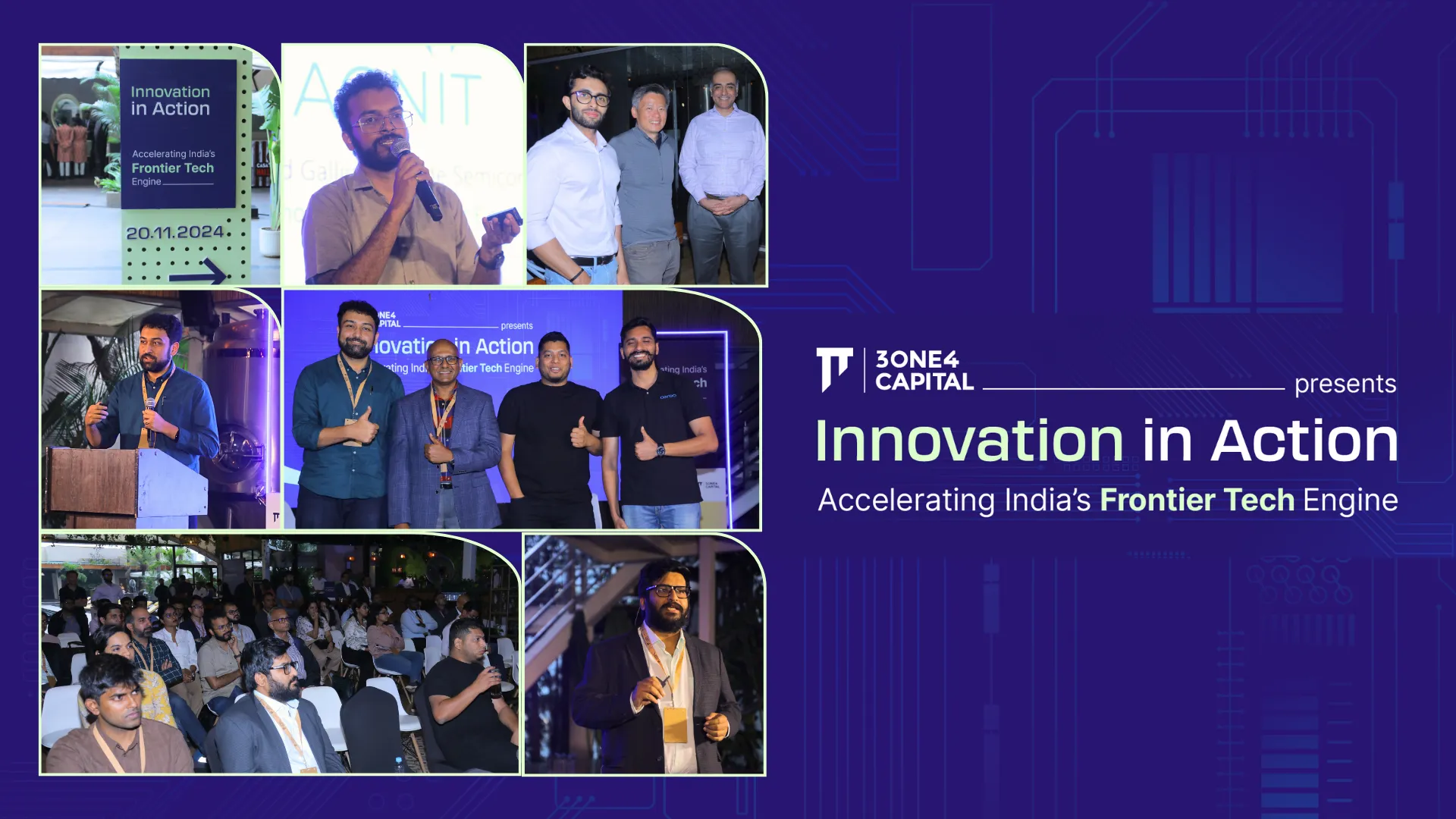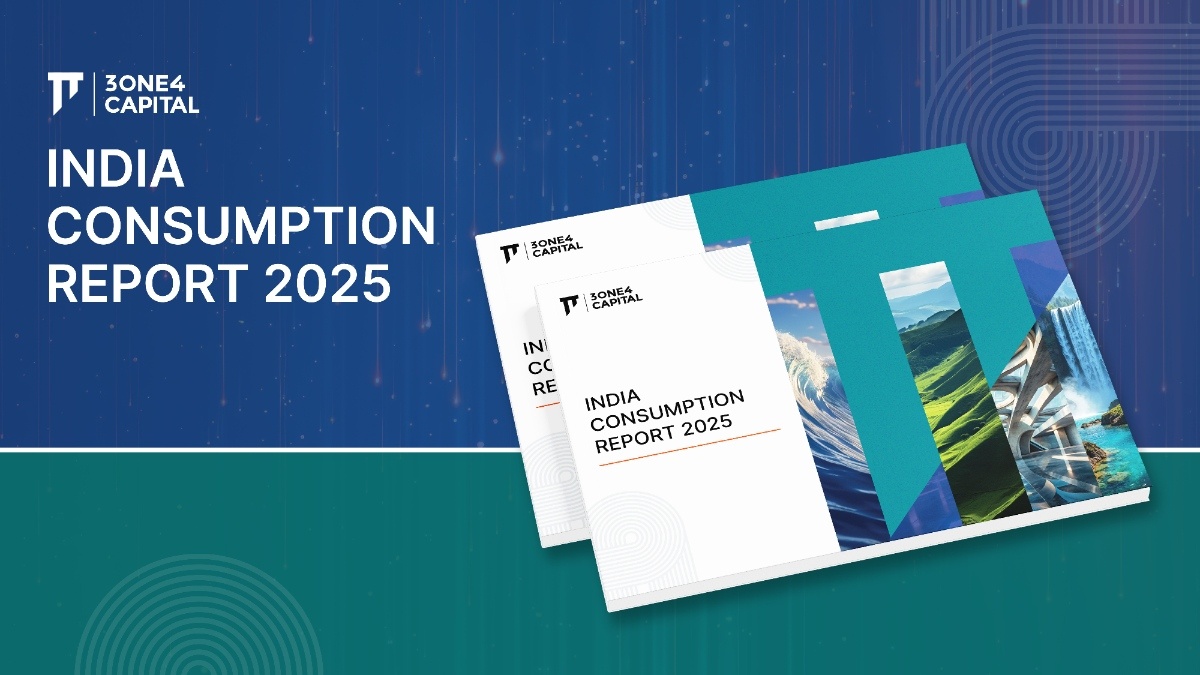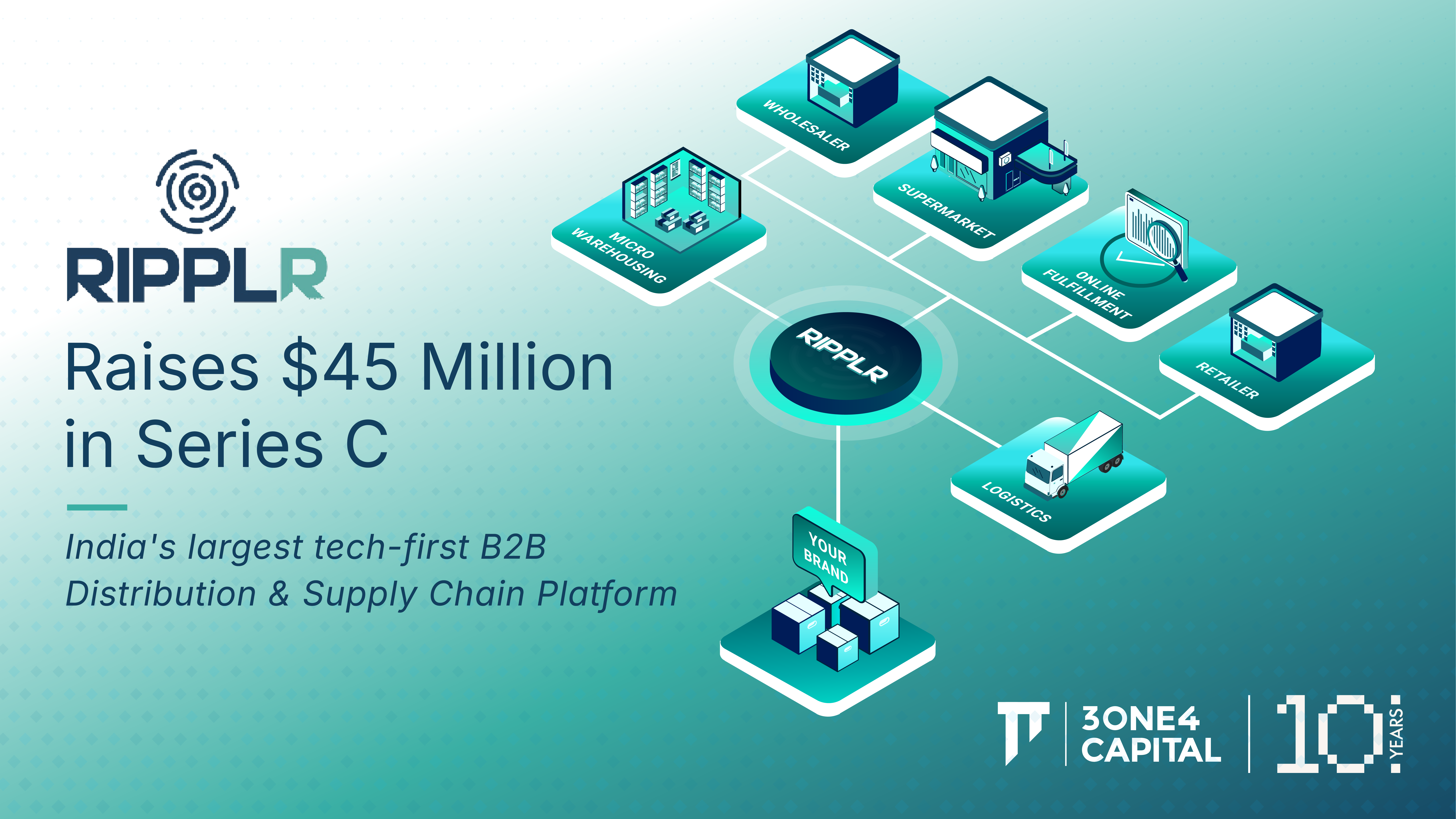
Tomorrow, Today: Deep Tech as India’s Next Leap Forward
Technology has always been a harbinger of change. From the advent of the internet to the rise of artificial intelligence, its rapid evolution has reshaped industries, economies, and societies. In 2024, as the world stands on the cusp of another transformative era, the spotlight is firmly on deep tech—a realm where cutting-edge innovation meets real-world applications.
India’s deep tech story is at an inflection point, with over 3,000 startups pushing the boundaries in AI, robotics, semiconductors, healthcare, and energy. In 2023 alone, deep tech investment reached approximately $500 million, reflecting the vast potential of this sector.
As early partners to several pioneering ventures in this space, we're witnessing firsthand the incredible ways these technologies are reshaping India’s future.
On November 20, 3one4 Capital hosted an exclusive event spotlighting the future of deep tech in India. We brought together an exceptional lineup of founders who are building foundational technologies from India to the world.
The Big Picture: Why Deep Tech?
Deep tech differs from traditional technology ventures, focusing on solutions grounded in substantial scientific advances and complex engineering. It addresses problems of immense scale, often requiring years of research and development before reaching market viability.
For India, this means leveraging its unique strengths—an expansive talent pool, a thriving startup ecosystem, and a rapidly digitising economy—to tackle global challenges, ranging from climate change to healthcare inequity.
Pranav Pai framed it succinctly:
“Deep tech is about solving tomorrow’s problems today. It’s the space where ambition and impact converge.”
Technology as a Force Multiplier: Pranav Pai’s Keynote
Pranav set the tone for the event with an impassioned keynote that explored how technology has become the primary driver of global transformation.
The world today is undeniably tech-driven. More than half of the global population is online, smartphones are ubiquitous, and social media shapes conversations and ideologies. In the financial realm, tech companies dominate global market capitalisations. Giants like Apple, Alphabet, and Amazon have transcended their original niches, diversifying into sectors such as healthcare, autonomous vehicles, and finance. This integration across domains underscores a shift - technology is no longer an enabler but the core driver of economic and social ecosystems.
India’s Moment in Deep Tech
One of Pranav’s key messages was the need for self-reliance in technology. He urges India to build and own its tech infrastructure to ensure the country captures value from the next wave of global innovation.
He stressed the importance of India carving out a niche in the global tech ecosystem, particularly in areas like energy, healthcare, and manufacturing.
"India must capture the value of the transversal technologies reshaping the world. If we don’t, the coordinated capture of our digital day by global monopolies is inevitable,” he said, leaving the audience with a compelling call to action.
India is uniquely positioned in this global transformation. With over 800 million internet users, a billion mobile connections, and 350 million UPI users, the country has demonstrated a remarkable appetite for technology adoption. This widespread digitalisation, coupled with a robust entrepreneurial ecosystem, sets the stage for India to emerge as a leader in frontier technologies.
“India has the talent, the market, and the ambition. What we need now is a concerted effort to translate these into global leadership in deep tech,” he concluded.
3one4 Capital’s Deep Tech Lens
At 3one4 Capital, the focus on Frontier Technology is built on a commitment to redefining industries and addressing global challenges through responsible innovation.
We look beyond incremental innovations to support founders developing foundational solutions in critical domains like healthcare, energy, semiconductors, and advanced materials - technologies that can reshape entire industries and address global problems.
Guided by an ethos of bold ambition and unyielding impact, 3one4 goes beyond capital. The firm immerses itself in catalysing startups that merge scientific breakthroughs with market relevance. Through a deeply engaged model, 3one4 enables these startups to develop market-ready, technically rigorous solutions that push boundaries. With India’s incredible appetite for technology and a burgeoning entrepreneurial ecosystem as a launchpad, 3one4 Capital engineers not just economic growth, but a future where technology empowers humanity at scale.
Innovation in Healthcare: Dozee’s Game-Changing Technology
After Pranav’s keynote, the spotlight shifted to Gaurav Parchani, Co-founder of Dozee, who presented a groundbreaking approach to tackling one of healthcare's most persistent challenges: the lack of continuous, scalable, and non-invasive patient monitoring.
Addressing a Critical Gap
Gaurav opened by illustrating the inefficiencies of traditional healthcare systems. In many hospitals, patient monitoring outside ICUs relies on manual spot checks, a process both labor-intensive and prone to delays. These intermittent checks leave critical gaps, with 42% of adverse events occurring between observations.
“Imagine being able to predict health deterioration 16 hours before it happens. That’s not just a promise; it’s our reality,” Gaurav remarked.
Dozee’s AI-powered platform offers a game-changing solution. By embedding sensors beneath hospital beds, the technology captures key vitals—such as heart rate, respiratory rate, and oxygen saturation—without requiring wearable devices. This data is processed in real time to predict potential health issues, enabling early intervention.
The results are remarkable. In clinical trials involving 100 hospital beds, Dozee’s system demonstrated the potential to save over 200 lives annually, underscoring the transformative impact of continuous, real-time monitoring.
Scaling Impact Across India
Dozee has already partnered with 20 hospitals across India and is expanding rapidly. Its innovative solution proved especially vital during the COVID-19 pandemic, where it enabled remote patient monitoring, alleviating the burden on overstretched healthcare workers while enhancing patient safety.
Beyond acute care, Dozee’s technology has shown significant promise in long-term care facilities, offering a scalable, cost-effective approach to monitoring patients over extended periods.
“We see ourselves not just as a technology company but as a catalyst for systemic change in healthcare,” Gaurav concluded.
Gallium Nitride: A Semiconductor Revolution by AGNIT
Next, Hareesh Chandrasekar, Co-founder of AGNIT Semiconductors, introduced the audience to the transformative potential of gallium nitride (GaN) semiconductors. Unlike traditional silicon, GaN offers unparalleled efficiency in power management and wireless communication.
GaN is a next-generation semiconductor material that is reshaping industries such as telecommunications and renewable energy.
"Gallium nitride is not a replacement for silicon but a complement that enables high-efficiency, low-footprint systems," Hareesh said.
GaN’s applications are vast, ranging from 5G networks to EV fast chargers and satellite communications. For instance, 5G power amplifiers built with GaN consume significantly less energy than their silicon counterparts, reducing costs and environmental impact.
Building India’s Semiconductor Ecosystem
AGNIT Semiconductors is not just India’s first GaN product company but also a trailblazer in creating a local semiconductor ecosystem. AGNIT focuses on developing high-performance solutions for radio-frequency (RF) and power devices. These solutions are crucial for electronics and wireless communications, including 5G networks, radar systems, and grid-scale power controls. The company has developed differentiated intellectual property over 15 years of R&D at the Indian Institute of Science (IISc), Bangalore.
Hareesh highlighted the government’s role in supporting startups like AGNIT through initiatives like a $50 million production line at the Indian Institute of Science.
"Semiconductors are the foundation of modern technology. By building GaN capabilities, we are ensuring India’s technological sovereignty," Hareesh emphasised.
AGNIT’s products are already making waves globally, with applications in EV charging, radar systems, and satellite communications. The company’s vision aligns with India’s broader goal of becoming a global semiconductor hub.
Scaling Frontier Tech - Insights from the Panel Discussion
The evening culminated in a panel comprising Pranav Pai (3one4 Capital), Arun Vinayak (Exponent Energy), Subramani Ramachandrappa (Fermbox), and Vipul Singh (Aereo) as they dissected the dynamics of India’s deep tech ecosystem. Their conversation revolved around scaling deep tech ventures, overcoming systemic challenges, and crafting globally relevant solutions.
The evening’s discussions culminated in a thought-provoking panel featuring Arun Vinayak (Exponent Energy), Subramani Ramachandrappa (Fermbox), and Vipul Singh (Aereo). Moderated by Pranav Pai, the panel explored the intricacies of scaling deep tech ventures, overcoming systemic challenges, and creating solutions that are globally relevant.
- Early Market Focus: Building for Scale
Reflecting on his entrepreneurial journey from Ather Energy to Exponent Energy, Arun Vinayak emphasised the critical need to embed go-to-market strategies early in a company’s lifecycle.
“It’s not just about innovation—it’s about building robust customer networks and leveraging data to create lasting value,” Arun noted.
He highlighted how aligning technical development with market readiness ensures startups can transition smoothly from R&D to scalable commercial models. This integration is particularly vital in deep tech, where time-to-market can be significantly longer than in other sectors.
- Patient Capital
Subramani Ramachandrappa highlighted the surge of synthetic biology, driven by global shifts toward sustainability. Fermbox, under his leadership, is developing scalable bio-based solutions to replace petrochemicals. Yet, he pointed out the need for patient capital to support the long development cycles inherent in deep tech.
“The world is finally ready for sustainable, high-volume products—but investors need to match that readiness with long-term vision.”
- Driving Value with Aerial Intelligence
Vipul Singh brought a practical perspective on aligning deep tech with measurable customer outcomes. He illustrated how Aereo’s drone technology is transforming industries such as agriculture and logistics by delivering profitability and efficiency.
“Deep tech success lies in solving real problems and driving measurable value for customers,” he said, stressing the importance of sales-oriented approaches.
Through its focus on tangible customer benefits, Aereo has demonstrated how deep tech can bridge the gap between innovation and commercial viability.
- The Investor Perspective: Crafting a Right to Win
Bringing the discussion full circle, Pranav Pai offered insights from the vantage point of a venture capitalist. He discussed how the investment landscape for deep tech is evolving, with an increasing demand for clarity in business models and differentiation.
“Today’s investors want clear narratives and evidence of a ‘right to win.’ Startups must show how they can lead and redefine their industries,” Pranav explained.
His reflections tied together the themes of the panel, calling for collaboration between startups, investors, and stakeholders to overcome challenges unique to deep tech, such as extended R&D timelines and capital-intensive scaling processes.
The Way Forward
The next 25 years hold extraordinary promise. Imagine a future where energy is virtually free, every student has access to personalised AI tutors, and healthcare systems predict and prevent diseases with unparalleled precision. For India, the opportunity lies in building solutions that address not only local challenges but also cater to global markets.
As emerging economies seek technological pathways, India's deep tech trajectory will serve as a compelling blueprint - proving that innovation can be a powerful catalyst for sustainable, equitable progress.
The future is not something that happens to us; it's something we actively create. And in this creation, deep tech will be our most potent instrument of change.
“The world is watching India. The time to lead is now.” - Pranav Pai


.webp)












